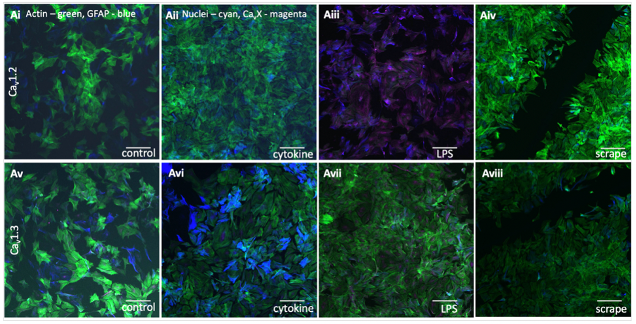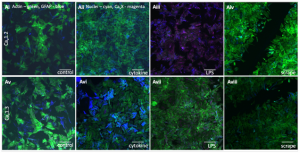Biomedical Engineering PhD candidate Ti’Air Riggins has been awarded the NIH Blueprint Diversity Specialized Predoctoral to Postdoctoral Advancement in Neuroscience Award (F99/K00). This award supports graduate students from diverse backgrounds underrepresented in neuroscience research, from their graduate studies to their postdoctoral research. For Riggins, this award will help her transition from her graduate studies to a tenure-track career in academia with neuroscience-based research.
A graduate assistant in Dr. Erin Purcell’s lab at the Institute for Quantitative Health Science and Engineering (IQ), Riggins’ research focus is to investigate the impact of implantable neurotechnology on the genetic and proteomic change of normal astrocytes to reactive astrocytes. The goal of her research is to uncover knowledge on the change in astrocytic identity and function in response to implantable probes, and to learn more about brain foreign body response (FBR) to probes. She hopes that researchers will be able to use this information to develop strategies to prolong the function of probes in patients.
The potential of her research lies in its innovation, says Riggins. It bridges a knowledge gap about the functional effects of astrocyte reactivity by assessing calcium ion channel activity and expression in a model of the tissue response to electrode materials. Additionally, it has the potential to identify uncovered biomarkers of astrocyte reactivity that should be investigated to measure the FBR to probes via RNAsequencing. It also provides insight on how probe design can impact astrogliosis, potentially providing a new avenue to improve probe stability.
Riggins is mentored by Dr. Erin Purcell, assistant professor in the Department of Biomedical Engineering and investigator in the Neuroengineering Division at IQ.
“I am extremely proud of Ti’Air for earning this prestigious fellowship. She already has made important contributions to our laboratory, including co-authoring a recent review article and carving out new hypotheses related to our investigations of reactive astrocytes surrounding implanted neurotechnology. I look forward to supporting her continued path to success as a neural engineer,” says Dr. Purcell.
As a third-year PhD candidate, the award will provide funding for the remainder of Riggins’ graduate studies, four years of funding for her postdoctoral training, as well as sponsor travel and conference attendance.
- Communications contact: Saneeya Mir




